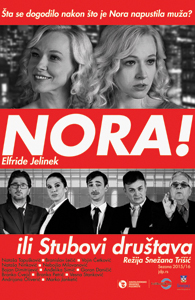
Elfride Jelinek’s drama, Nora, seriously satirizes what happens to Ibsen’s Nora when she leaves his/her husband’s Doll’s House and has to deal with the kind of Pillars of Society Ibsen wrote about. When she appears to be going on holiday, by some railroad tracks she meets someone who learns she seeks a job. She wants “to be a human being,” a goal she had to leave husband and family to achieve. Being allowed without references to go to work in a textiles factory, she finds fellow workers wondering how Nora could have been so vulnerable. The gals admit they like making babies but not looking after them. Nora sees a life there as not being liberated but still one of pleasing men and dominated by them. Burlesque-type music accompanies a period of her disappointment in the factory. Nora’s manager says he loves her because she hasn’t yet been ruined by being with the machines. Although her friend Eva wants him, the three get confused about their roles. There’s a dance (but not a tarantella) indicating Nora may want to be an artist. A foreman comes pretending he’ll help “the little people” but really wants them to help him profit. Nora is convinced she must go with someone rich, so she becomes the mistress of a big businessman, who’s enchanted by her figure and maybe even admires her wildness. The arrangement doesn’t last, and she moves on to be a sold-to-an-old-man concubine. Torvald next comes back into her life, and despite what appears to be their other attachments, Nora becomes his dominatrix.. She ends up dominating a business too, eschewing or twisting the idea of a social democracy. Still, Nora never seems to have become a liberated woman. Powerful sets on multiple levels help the drama seem realistic even when conventions differ in kind and spirit. Costumes range from simple to Nora’s very elegant get-ups under her rich bossman. Natasa Tapuskovic takes these as well as her role changes in her stride as definitely the star of this play and production. Her supporting cast valiantly helps, but the actors have a hard time not being stereotypes. Though the play is a giant deconstruction of the essentials of the Ibsen-launched myths, it often just seems to be traditional agitprop. Is Nora responsible for her fate? Or is it the patriarchal order and social mores?
